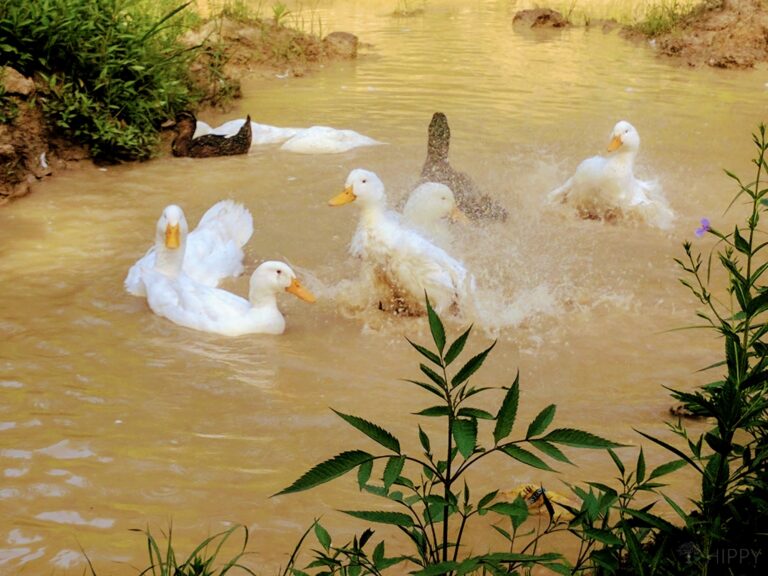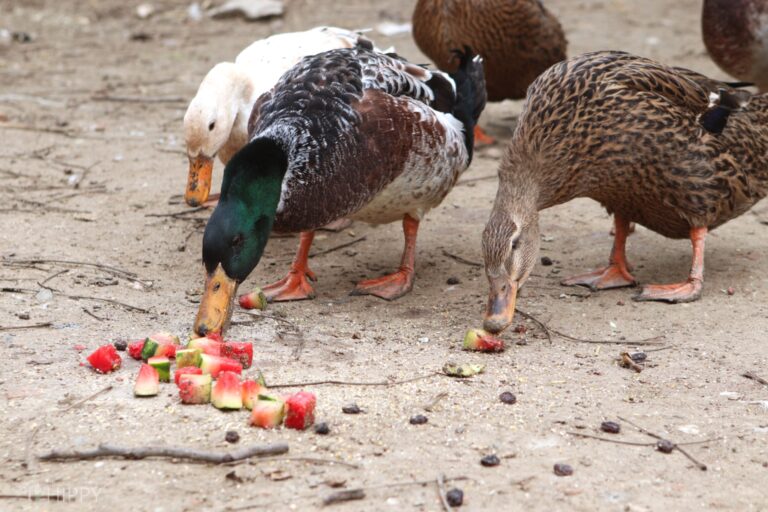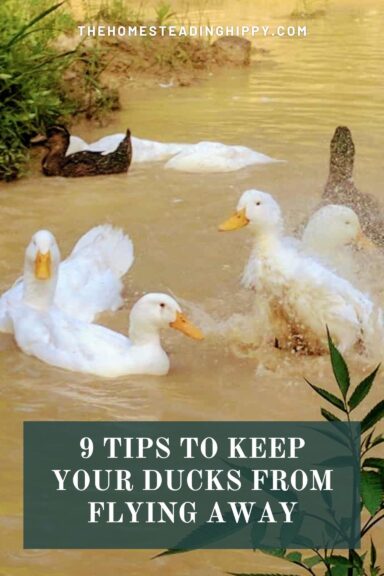Owning ducks presents several unique challenges compared to owning chickens. Probably the single biggest challenge is that more domestic duck breeds can fly, and fly pretty well.

Although they rarely keep up with their wild cousins, backyard ducks may be able to take flight for more than a mile at a time, and some of them can fly indefinitely. At any rate, these flight-worthy birds can easily escape from your property no matter what kind of fence you have around it.
The idea of your beloved flock just flying away one day is enough to make anybody anxious, so to help put your fears at ease, I’m bringing you a list of proven techniques to keep your ducks in place.
First Things First: Can Your Ducks Even Fly?
Before you go through all this trouble of trying to keep your ducks grounded, you need to know if they can even get off the ground!
Like I said, many more domestic breeds of ducks are capable of flight compared to chickens, even if it’s just limited flight, but not all of them are, and some only have a relatively low chance of being flight-worthy.
Ducks like Campbells, Mandarins, Harlequins, Appleyards, Calls, and East Indies are all known flyers. Pekins, Saxonies, Cayugas, Runners, Orpingtons, and Rouens generally cannot fly at all except in exceptional circumstances or individual birds.
But, never say never with ducks! Observe them and get to know them to see if yours are actually capable of flight.
If they are, or you just suspect they are, then take action… Now, let’s figure out which actions to take. On to the list!
Bond with Them
One of the best and easiest things you can do to keep your ducks in place is bonding. Raising your ducks from chicks means that they will imprint on you as a parental figure and later as a part of the flock.
Assuming you raise them right and treat them well, they’ll be a lot less inclined to fly away and leave you behind, especially when they see that you never take flight yourself!
This isn’t always a guarantee, especially with breeds that are readily capable of flying, but it goes a long way in all situations, regardless of the other circumstances.
If you rescue ducks, especially flightworthy adults, they’ll be much more prone to leave when they feel the call.
Keep Them Safe, Fed, and Happy
If you can give your ducks everything they need to thrive, including plenty of food, fresh, clean water, friends, shelter, and safety, then the thought will probably never occur to them to leave.
This is why most ducks travel around in the first place because they’re looking for these survival necessities!
I know it seems obvious, even rudimentary, but it’s the truth. Take good care of your ducks and they probably won’t want to leave unless something else is affecting them.
Optimize Flock Size and Ratios
A common problem that I see croping up with owners of large flocks (or those having problems with their birds flying the coop) is that their ducks are simply feeling overcrowded or there’s the wrong ratio of drakes to hens in the flock.
Ducks travel in large flocks, yes, but not all breeds are comfortable being around dozens of fellow birds in a domestic setting.
If they don’t have enough personal space, if they feel like there’s too much competition for food, water, and shelter, or if there is too much mating pressure, many of them will think of taking their chances elsewhere…

If they can leave, that’s exactly what they will do.
If you’re able, splitting flocks up into smaller sub-flocks is a good way to reduce this pressure, as is maintaining an ideal ratio of hens to drakes; a reliable rule of thumb is five or six females to one male, but you might be able to get away with less with some breeds, while others will need more. Do your homework!
Use Wing Weights
One easy and non-invasive way to completely spoil a duck’s chances of flying away is to attach a wing weight to them. A wing weight can really be anything as long as it won’t hurt the duck and it will unbalance their wing enough that attempting to flap and fly is completely foolhardy.
I know some folks that use small plastic washers that contain metal shot or powder for the purpose, but you can use nearly anything as long as you can attach it to the duck safely and securely.
Some folks do this with zip ties, but there are specialized plastic collars or velcro straps that can be used for the same purpose. The trick is to make sure it doesn’t cut off circulation or bite into the flesh of the wing.
You’ll always have to keep an eye on these things and make sure they stay attached, which can be a huge pain with a larger flock, but it’s also something you can implement right away and very quickly.
Clip Their Flight Feathers
Clipping the flight feathers is a technique for permanently grounding ducks and other poultry.
This doesn’t mutilate the duck if it’s done correctly, and it’s not permanent; all it is, is the clipping of the duck’s primary flight feathers on one or both wings. Clipping one wing is sufficient to prevent flight most of the time.
This takes some skill, because you can hurt the bird if you don’t know what you’re doing, but it’s easy and quick to do with training or by hiring a professional, and has the advantage of grounding the bird until such time as the feathers fully regrow.
This is the ideal solution for long-term grounding, especially if you have a flighty breed and know how to do it.
Train Them to Come to You
One of my favorite ways to keep ducks from flying away is to turn their psychology against them.
Ducks, like all birds, are extremely food motivated, and, especially if you raise them yourself and they are accustomed to getting treats from you, you can give them a signal that lets them know it’s time to get a tasty morsel.
This could be a bell, a whistle, a chime, or even a loud, spoken call. Every time you give them a treat, give them the signal. If they go flying away, give them the signal, and the conditioned response will see them banking and coming back in for a landing to get a tasty treat.
You might have to act fast to keep them from flying away again, but by then they’ll probably have forgotten why they flew away in the first place!
Reduce Sightlines
One thing I’ve noticed over the long years of keeping ducks is that the farther they can see, the more likely they are to fly away, even temporarily or for a little scouting trip. It must be something about that wide-open horizon that entices them.
If you can block their sight lines using shrubs, buildings, or any other kind of obstruction to sort of shrink their world a little bit, for lack of a better term, they’re less likely to fly the coop out of curiosity or for fun.
Eliminate Predator Pressure
Another huge motivator for ducks that want to get away from a place is pressure from predators. Make no mistake, ducks are prey animals, and they’re constantly eaten by all kinds of carnivores, those that live on the land, fly through the air, and even lurk under the water.
Birds of prey, dogs, coyotes, felines of all sizes, bears, badgers, hawks, eagles, owls, large fish, snapping turtles, and more would all love nothing more than to have a feast of duck.
Assuming you are letting your ducks free range, there’s only so much you can do to keep predators at bay, but whatever you can do, you should.
Even if you successfully protect your ducks from a predator attack, this will send their stress levels through the roof.
This will activate their literal survival flight response, and they might decide to take their chances elsewhere. Repeated attempts by predators all but guarantee that your ducks will do anything to escape and reach safety.
This is a tricky topic, one that we’ve covered in other articles, but it’s also complicated because many duck predators are protected by state and federal laws, meaning you can’t just kill them to solve the problem.
Keep Them in a Covered Run
If all else fails, you can prevent escape entirely by keeping your ducks inside a run. Netting or mesh is more than enough to keep ducks from flying away, and it has the added benefit of giving them protection against aerial predators.
Depending on the size of your flock, the size of your property, and other factors, covering your run with netting or mesh might be feasible or it might not be for a host of reasons, but it’s undoubtedly effective.
Another perk is that it completely obviates the need to clip wings, use wing weights, or anything else like that; your ducks simply cannot get past the roof over their heads, so to say, they aren’t going anywhere.

Tim is a farm boy with vast experience on homesteads, and with survival and prepping. He lives a self-reliant lifestyle along with his aging mother in a quiet and very conservative little town in Ohio. He teaches folks about security, prepping and self-sufficiency not just through his witty writing, but also in person.
Find out more about Tim and the rest of the crew here.
